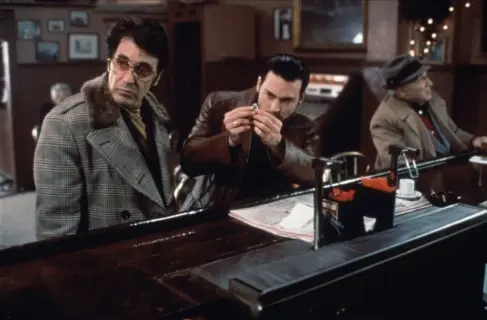Donnie Brasco (1997)
- Soames Inscker

- Aug 3, 2025
- 4 min read

Mike Newell’s Donnie Brasco is a gripping 1997 crime drama that delves deep into the psychological and emotional toll of undercover work in the mafia. Based on true events and Joseph D. Pistone’s memoir Donnie Brasco: My Undercover Life in the Mafia, the film presents a nuanced portrait of loyalty, deception, and the blurry moral lines that define the world of organised crime. With outstanding performances by Al Pacino and Johnny Depp, the film offers a restrained, character-driven alternative to the more operatic mob sagas like The Godfather or Goodfellas.
Plot Overview
Set in the 1970s, the film tells the story of FBI agent Joseph D. Pistone (Johnny Depp), who goes undercover as “Donnie Brasco,” a jewel thief tasked with infiltrating the New York City mob. Donnie becomes close to Benjamin “Lefty” Ruggiero (Al Pacino), a low-level but loyal hitman in the Bonanno crime family. Lefty is world-weary and perpetually unlucky, having “made” numerous men who ultimately surpass him in power and wealth, while he remains stuck at the bottom.
As Donnie rises in the mob’s ranks, the line between his real and undercover identities begins to blur. His close bond with Lefty—who treats him like a surrogate son—becomes a source of emotional conflict, even as Donnie’s true loyalties remain with the FBI.
Meanwhile, the strain of his double life affects his marriage to Maggie (Anne Heche), whose patience frays as Donnie’s absences and emotional detachment grow. The tension reaches its peak when Donnie’s success in the mob inadvertently leads Lefty to his downfall, culminating in a quietly devastating ending that emphasises the human cost of undercover work.
Performances

Johnny Depp as Donnie Brasco / Joseph Pistone
Depp delivers a restrained and internalised performance, eschewing his usual flamboyance for a role rooted in subtlety and psychological nuance. He convincingly portrays the duality of a man caught between duty and an emotional attachment to the very people he is sworn to bring down. His growing moral conflict forms the film’s emotional core.
Al Pacino as Lefty Ruggiero
Pacino offers one of his finest, most understated performances as Lefty. Unlike the fiery, dominating characters he played in Scarface or The Godfather, this is a portrayal of quiet resignation—a man who has given his life to the mob and received little in return. Pacino humanises Lefty, making his final scenes with Donnie heartbreaking.
Supporting Cast
Michael Madsen as Sonny Black embodies a colder, more pragmatic brand of mob leadership.
Anne Heche as Maggie Pistone provides the domestic counterbalance to Donnie’s criminal entanglement, representing the emotional stakes of his undercover life.
Bruno Kirby and James Russo round out a strong ensemble, adding authenticity to the mob world.
Direction and Screenplay
Mike Newell, known for films like Four Weddings and a Funeral, takes a grounded and character-driven approach to the mob genre. Rather than glorifying the violence or excesses of organised crime, Donnie Brasco focuses on the intimate human relationships and the psychological costs of betrayal.
Paul Attanasio’s screenplay is tightly written, balancing tension, dark humour, and emotional resonance. The dialogue feels authentic, and the film’s pacing allows the audience to slowly sink into the underworld alongside Donnie.
Themes and Analysis
Donnie Brasco explores several powerful themes:
Loyalty and Betrayal – The film presents loyalty as both a virtue and a trap. Lefty’s devotion to the mob and Donnie’s ultimate betrayal form the tragic core of the story.
Identity and Morality – Donnie’s undercover persona begins to bleed into his real self, blurring the line between duty and empathy.
The Human Cost of Crime – Unlike many mob films, this story ends not with grand violence, but with quiet tragedy: a loyal soldier walking to his death because of a trust he should never have given.
Isolation of Undercover Work – Donnie’s infiltration isolates him from his family and his own sense of self, emphasizing the psychological strain of law enforcement work in deep cover.
Cinematography and Style
The film’s visual style, handled by cinematographer Peter Sova, is muted and naturalistic, reflecting the gritty urban atmosphere of 1970s New York. Unlike the glossy aesthetic of some crime dramas, Donnie Brasco opts for a lived-in realism that grounds its emotional weight.
Patrick Doyle’s understated score complements the film’s tone, using music sparingly to heighten tension and emotional beats without overshadowing the performances.
Cultural and Critical Impact
Upon release, Donnie Brasco was both a critical and commercial success. Critics praised the film for its nuanced storytelling, strong performances, and character-driven focus. The film earned an Academy Award nomination for Best Adapted Screenplay and multiple BAFTA and Golden Globe nominations.
It also reinforced Johnny Depp’s credibility as a serious dramatic actor and showcased Al Pacino’s ability to disappear into a more subdued, tragic role. Over time, the film has gained a reputation as one of the more authentic depictions of undercover life and mob dynamics, distinct from the operatic violence of films like Goodfellas.
Conclusion
Donnie Brasco is a compelling and emotionally resonant entry in the crime genre. Its power lies not in explosive action but in the quiet devastation of relationships destroyed by duty and deception. Pacino and Depp’s chemistry, combined with Newell’s restrained direction, create a film that is as tragic as it is thrilling.
By the time the credits roll, the film leaves a lasting impression: in the world of crime and law enforcement, loyalty is a double-edged sword, and even victories come at an unbearable personal cost.





